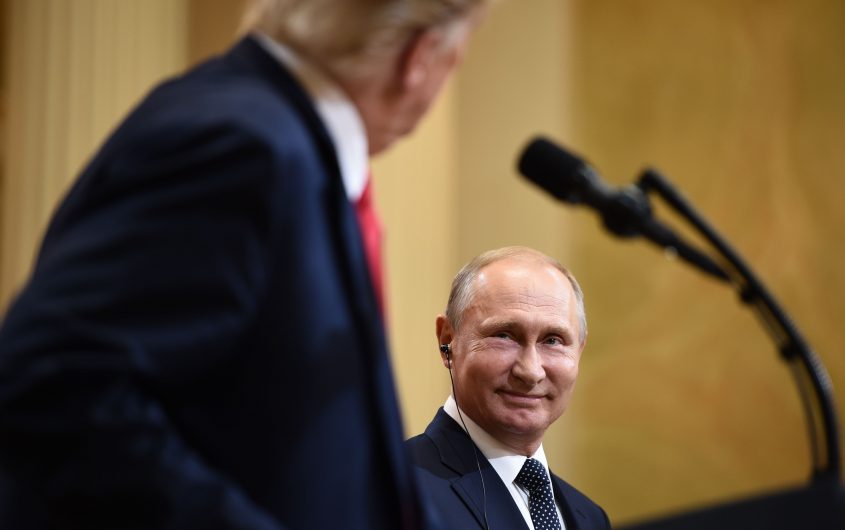
BRENDAN SMIALOWSKI/AFP/Getty Images
Is “Economic Security” a Thing?

Peter S. Rashish
Vice President; Director, Geoeconomics Program
Peter S. Rashish, who counts over 30 years of experience counseling corporations, think tanks, foundations, and international organizations on transatlantic trade and economic strategy, is Vice President and Director of the Geoeconomics Program at AICGS. He also writes The Wider Atlantic blog.
Mr. Rashish has served as Vice President for Europe and Eurasia at the U.S. Chamber of Commerce, where he spearheaded the Chamber’s advocacy ahead of the launch of the Transatlantic Trade and Investment Partnership. Previously, Mr. Rashish was a Senior Advisor for Europe at McLarty Associates, Executive Vice President of the European Institute, and a staff member and consultant at the International Energy Agency, the World Bank, UN Trade and Development, the Atlantic Council, the Bertelsmann Foundation, and the German Marshall Fund.
Mr. Rashish has testified before the House Financial Services Subcommittee on International Monetary Policy and Trade and the House Foreign Affairs Subcommittee on Europe and Eurasia and has advised three U.S. presidential campaigns. He has been a featured speaker at the Munich Security Conference, the Aspen Ideas Festival, and the European Forum Alpbach and is a member of the Board of Directors of the Jean Monnet Institute in Paris and a Senior Advisor to the European Policy Centre in Brussels. His commentaries have been published in The New York Times, the Financial Times, The Wall Street Journal, Foreign Policy, and The National Interest, and he has appeared on PBS, CNBC, CNN, NPR, and the BBC.
He earned a BA from Harvard College and an MPhil in international relations from Oxford University. He speaks French, German, Italian, and Spanish.
Late last week Russia won a case against Ukraine in the World Trade Organization that centered on whether Moscow had the right to invoke national security to limit Ukrainian rail transit through Russian territory. As the WTO’s ruling makes clear, hostilities in eastern Ukraine at the time constituted “an emergency in international relations” that justified the Russian measures.
Perhaps more noteworthy than the substance of the ruling is that it happened at all. Importantly, the WTO dispute panel also opined that states do not have the right to decide for themselves if national security threats allow protectionist measures. From now on, the Geneva-based organization will be empowered to adjudicate if complaints are made about potentially wrongful uses of national security to justify trade restrictions.
The Trump administration, which supported Russia, will be pleased that the WTO decided in Moscow’s favor, but will be irked that the WTO will have the competence to rule on such matters. That step will open the door to cases about the legality of tariffs on steel and aluminum that the Trump administration has imposed under the national security exception provided by Section 232 of the 1962 Trade Expansion Act, as well as possible future tariffs on cars and car parts.
The White House clearly believes U.S. trade law gives it the right to do what it wants in the name of national security. If we look closely at what the administration has been saying, however, it is not just making that claim but an even more novel one—that “economic security is national security” or that “economic security is military security.”
Does this make any sense? Is it right to talk about “economic security”?
Certainly, if what we mean by that term is a basic social safety net, access to health care and education, and a decent pension—in other words economic wellbeing—then the answer is yes.
But that’s not what the Trump administration means when it talks about “economic security.” Instead it is using the term as a substitute for economic prosperity, both in the traditional way (strong GDP growth, low inflation, full employment) and with a Trumpian add-on (a large domestic manufacturing sector in traditional industries like steel and automobiles).
By pulling this rhetorical sleight of hand, the U.S. administration is suggesting that trade is bad—that imports from abroad that are essential to economic prosperity are in fact harmful to it because they aren’t made in the United States. Don’t worry, it seems to be saying, if buying and producing all those cars in the U.S. becomes more expensive because of tariffs on imported vehicles and the parts and steel used to make them. Put aside concerns about rising unemployment and slowing GDP growth. It is all worth it in the name of “economic security.”
There is one more unhelpful aspect of talking about “economic security.” It puts the spotlight not only on trade as one cause of the problem (declining U.S. manufacturing employment), but also on trade policy as the solution (tariffs, quotas). That is misguided.
No amount of closing the U.S. market is going to improve the skills level of the domestic workforce, the state of the country’s infrastructure, or opportunities for people who have lost their jobs (whether owing to trade, technological change, or competition from other domestic firms). That will take more public and private investment in research, education, training, transportation, and digital networks, as well as social welfare policies that act both as a cushion absorbing shocks and a trampoline promoting resilience.
There is national security and there is economic prosperity. And there is also economic wellbeing. But there is no such thing as “economic security” and it shouldn’t be the basis for trade policy.








